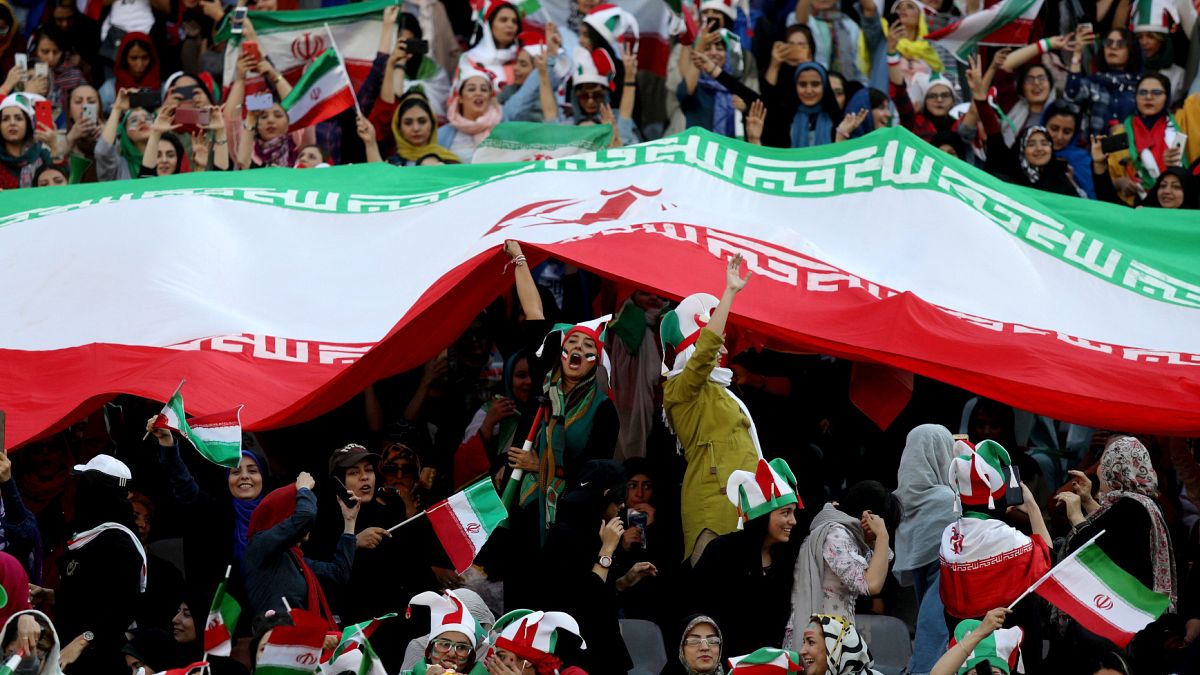Social and international news coverage was awash with women’s faces daubed in green and red face paint and proudly holding Iranian flags aloft.
Social and international news coverage was awash with women’s faces daubed in green and red face paint and proudly holding Iranian flags aloft.
That's because at Iran’s World Cup qualifier against Cambodia on Thursday it was the first time in 40 years women have been able to purchase and freely attend a football game.
“We made history today,” Tehran based journalist Maryam Pappi tells Euronews of her first visit to the stadium.
“In the stadium we could hardly hear each other - though at the same time it was a great feeling of having one voice, a voice for our right.”
Indeed it’s a right that has long been denied to women in Iran.
But yesterday was different, women were welcomed into the stadium. Despite the high police presence, Maryam says they “tried to be nice”.
“They offered us cold drinks and watermelon, it was a big surprise for us”.
Ali Rabiei, Iranian Minister of Cooperatives, Labour and Social Welfare on Twitter praised, the “quiet”, “orderly” women and girls seated in the Azadi (meaning freedom in Persian) Stadium. He added: “I am glad we are at liberty”.
But, has freedom really arrived at Azadi Stadium?
Last month international attention was garnered by the self-immolation of Sahar Khodayari outside a Tehran court.
Iran’s so-called Blue Girl, in reference to her favourite team Esteghlal FC’s colours, had been awaiting sentencing for attempting to sneak into a game disguised as a man.
The story mobilised football teams to support Iranian women’s cause and prompted FIFA President Gianni Infantino to call for Iran to let women attend the forthcoming qualifier game.
Though Iranian government Minister Ali Rabiei was swift to highlight in a tweet: "The entry of women into the stadium is the result of internal efforts, not external pressure."
This has been a hard fight for a right that is not prescribed against in Iranian law.
Mansoureh Mills, Amnesty International’s Iran Researcher, told Euronews: “There is no legislation in place, though since 1981 whilst it hasn’t been written into law, the practice has been strictly enforced by Iranian authorities.
"They make all kinds of excuses - primarily they don’t want men and women to mix, foul language and poor behaviour are all cited as reasons for the ban."
Many believe the external pressure hasn’t been mounted and responsibility has been floated namely by FIFA.
OpenStadiums founder Sara told Euronews of her encounter with Infantino last year.
“I told him this is our daily life, women are being interrogated and imprisoned, just for being advocates for this cause, you should be acting as fast as you can."
Amnesty International’s MENA Advocacy Director Philip Luther similarly believes the reaction has been too slow.
‘FIFA has reiterated its position that women should be permitted to enter football stadiums for all matches, and that’s important but the fact that it’s reiterated this message means it’s been made before. And our concern is that it hasn’t followed up rigorously enough behind the scenes.
"It does have the power to force the Iranian authorities to comply with that instruction, to date Iran hasn’t moved. The eyes of the world are on now Iran."
Indeed the international coverage of the game could not shy away from the glaringly empty stalls in the stadium.
Using the hashtag #WakeUpFIFA Iranian football fans tweeted screenshots of the 80,000 capacity stadium’s ticketing webpage.
Maryam recalls, “At the beginning, they allocated less than 2% of tickets to women, the sections A6 -A9 were dedicated to women”.
Though on the day “many didn’t have tickets, they opened some of the doors to them, and another section of 800. But anyhow it wasn’t enough - though the stadium was almost empty there were less than 3000 men in the stadium and they didn’t sell more to women."
In a statement to Euronews, FIFA’s spokesperson confirmed: “the number of women in the stadium needs to be determined by the demand for such tickets, without any arbitrary limitation being imposed”.
They promised details on next steps will follow an assessment of the qualifier game in conjunction with FIFA’s delegation in Tehran.
Luther labelled the qualifier game a “cynical publicity stunt and show”, though the experience is hard won and extremely momentous for Iranian women experiencing daily restrictions in their freedom.
Masih Alinejad, a US-based Iranian activist and founder of White Wednesdays anti-hijab law protest, tweeted: "Today, I had tears in my eyes as my fellow female compatriots in Iran were in stadiums for the first time."
She called on both "domestic activism" and "international pressure" to "help Iranians achieve their civil rights".
Speaking of Iran’s 14 - 0 victory, Maryam tells Euronews,
“We take it as good luck from women’s presence in the stadium. I hope our first presence won’t be our last one, and Iranian women will be able to watch all matches."
